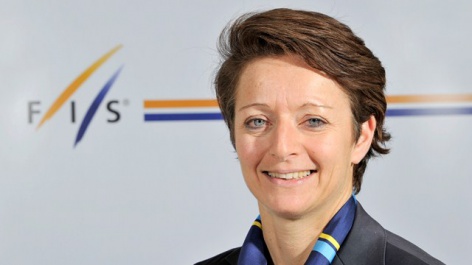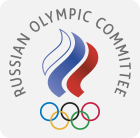
FIS News


Sarah Lewis celebrates 20-year-anniversary as FIS Secretary General
FIS Secretary General Sarah Lewis will celebrate a major milestone on 1st May when she celebrates her 20-year anniversary working with FIS.
Newsflash took the chance to sit down with Sarah Lewis and enjoy both a look back at the past and glimpse into the future.
On 1st May you will have been working for FIS for 20 years!
I would like to begin by thanking the FIS family for giving me the opportunity to serve the organisation for two decades. It is a truly rewarding experience to have the chance to work for the international governing body. As a young ski racer in Great Britain, from 16 years of age FIS points played a major role in my life, but at that time I was not aware of the organisation behind the name. To have had the possibility to transfer a modest career as an athlete, through voluntary work at regional level and within the ski business, to the National Ski Association and onto a leading role on the organisational side at FIS is a privilege.
Describe the evolution of your role within FIS?
I joined FIS in 1994 as Coordinator for the Alpine Continental Cups, which was a newly created position, following the introduction of professional management at World Cup level several years earlier. In 1998, the then Secretary General, Gian Franco Kasper was elected as FIS President, succeeding Marc Hodler who had been the incumbent for 47 years. The new President asked if I would take on the position of Director shortly after his election and the Council then appointed me as Secretary General at the FIS Congress in 2000 in Melbourne.
What have been the biggest changes in the last 20 years?
There is a long list, but how about mentioning the internet and e-mail, which we didn’t have in 1994, as well as global mobile communication?! This has revolutionised our ability to communicate both amongst the FIS membership and also with the public at large about our sport.
How has FIS changed in those 20 years?
The organisation has become more global. There are now 121 member National Ski Associations, which has increased from 87 since 1994, although to a certain extent this is due to geopolitical factors. Many more nations participate in and organise competitions, as well as being represented in FIS Committees. Our team of 59 full and part-time technical and administrative staff comes from five continents and 18 nations.
What accomplishment stands out most in those 20 years?
It’s about FIS the accomplishments of FIS as an organisation. From an internal perspective for the FIS member National Ski Associations and Organisers we have been able to increase the level of professional support, whilst achieving solid financial results to pay out additional funding to the members every two-year Congress period. Externally the sports have grown and developed significantly, an indication of which is the number of FIS competitions on the programme of the Olympic Winter Games, which has grown from 29 to 47 since 1994.
How has FIS' role in international sports evolved in the last 20 years?
FIS is recognised as one of the three large winter sports federations, together with Ice Skating and Ice Hockey, notably through the proportion of competitions on the programme of the Olympic Winter Games, as well as on the television screens each week during the winter season.
But over the last 10 years, FIS has been at the forefront of innovating both with its’ traditional disciplines, such as Cross-Country Skiing, but also introducing young, fresh disciplines and events to the winter sports agenda including the Olympic Winter Games on skis and snowboards.
Last month at the Association of International Olympic Winter Federations (AIOWF) General Assembly, FIS President Gian Franco Kasper, who is highly respected in the international sports movement, was elected President of the organisation and I have been appointed Secretary General. We appreciate the recognition of FIS amongst our colleagues and will engage closely with them in the interest of all the winter sports.
What was the biggest challenge you faced or had to overcome?
The doping scandals in 2001 and 2002 could certainly be classified as a major challenge, which brought the credibility of Cross-Country Skiing into serious question. We confronted the problem, invested in a serious FIS anti-doping programme, joined forces with WADA and worked alongside the IOC to deal with the doping issues head on.
The fatal and serious accidents that have occurred are a reminder of the risks involved that demonstrate why even sports that are such fun require constant respect and vigilance from all parties.
How do you see FIS evolving in the next 20 years?
The tasks are endless and it is impossible to state the evolution in 20 years-time, but here are a few points for the time being. We intend to keep evolving the disciplines to remain at the forefront of the winter sports agenda. New technologies provide more opportunities to interact and communicate about the competitions, the athletes and the background stories. The Bring Children to the Snow programme that is less than 10 years old has demonstrated it can really help to stimulate activities and generate enthusiasm to encourage newcomers, especially youngsters, which is vital for the future of both recreational as well as competitive winter sports.
On an ongoing basis we will continue to strive to improve services, as well as the efficiency of the organisation and listen to the ideas and feedback of the FIS members.
Any final words before you celebrate your anniversary on 1st May?
FIS is fortunate to have so many dedicated and expert officials and volunteers that enable the sport to take place - the sense of community within the organisation is a fantastic environment in which to work. I sincerely respect the tremendous trust I have enjoyed from the FIS family throughout 20 years and will give my utmost to help FIS continue to progress.
Newsflash took the chance to sit down with Sarah Lewis and enjoy both a look back at the past and glimpse into the future.
On 1st May you will have been working for FIS for 20 years!
I would like to begin by thanking the FIS family for giving me the opportunity to serve the organisation for two decades. It is a truly rewarding experience to have the chance to work for the international governing body. As a young ski racer in Great Britain, from 16 years of age FIS points played a major role in my life, but at that time I was not aware of the organisation behind the name. To have had the possibility to transfer a modest career as an athlete, through voluntary work at regional level and within the ski business, to the National Ski Association and onto a leading role on the organisational side at FIS is a privilege.
Describe the evolution of your role within FIS?
I joined FIS in 1994 as Coordinator for the Alpine Continental Cups, which was a newly created position, following the introduction of professional management at World Cup level several years earlier. In 1998, the then Secretary General, Gian Franco Kasper was elected as FIS President, succeeding Marc Hodler who had been the incumbent for 47 years. The new President asked if I would take on the position of Director shortly after his election and the Council then appointed me as Secretary General at the FIS Congress in 2000 in Melbourne.
What have been the biggest changes in the last 20 years?
There is a long list, but how about mentioning the internet and e-mail, which we didn’t have in 1994, as well as global mobile communication?! This has revolutionised our ability to communicate both amongst the FIS membership and also with the public at large about our sport.
How has FIS changed in those 20 years?
The organisation has become more global. There are now 121 member National Ski Associations, which has increased from 87 since 1994, although to a certain extent this is due to geopolitical factors. Many more nations participate in and organise competitions, as well as being represented in FIS Committees. Our team of 59 full and part-time technical and administrative staff comes from five continents and 18 nations.
What accomplishment stands out most in those 20 years?
It’s about FIS the accomplishments of FIS as an organisation. From an internal perspective for the FIS member National Ski Associations and Organisers we have been able to increase the level of professional support, whilst achieving solid financial results to pay out additional funding to the members every two-year Congress period. Externally the sports have grown and developed significantly, an indication of which is the number of FIS competitions on the programme of the Olympic Winter Games, which has grown from 29 to 47 since 1994.
How has FIS' role in international sports evolved in the last 20 years?
FIS is recognised as one of the three large winter sports federations, together with Ice Skating and Ice Hockey, notably through the proportion of competitions on the programme of the Olympic Winter Games, as well as on the television screens each week during the winter season.
But over the last 10 years, FIS has been at the forefront of innovating both with its’ traditional disciplines, such as Cross-Country Skiing, but also introducing young, fresh disciplines and events to the winter sports agenda including the Olympic Winter Games on skis and snowboards.
Last month at the Association of International Olympic Winter Federations (AIOWF) General Assembly, FIS President Gian Franco Kasper, who is highly respected in the international sports movement, was elected President of the organisation and I have been appointed Secretary General. We appreciate the recognition of FIS amongst our colleagues and will engage closely with them in the interest of all the winter sports.
What was the biggest challenge you faced or had to overcome?
The doping scandals in 2001 and 2002 could certainly be classified as a major challenge, which brought the credibility of Cross-Country Skiing into serious question. We confronted the problem, invested in a serious FIS anti-doping programme, joined forces with WADA and worked alongside the IOC to deal with the doping issues head on.
The fatal and serious accidents that have occurred are a reminder of the risks involved that demonstrate why even sports that are such fun require constant respect and vigilance from all parties.
How do you see FIS evolving in the next 20 years?
The tasks are endless and it is impossible to state the evolution in 20 years-time, but here are a few points for the time being. We intend to keep evolving the disciplines to remain at the forefront of the winter sports agenda. New technologies provide more opportunities to interact and communicate about the competitions, the athletes and the background stories. The Bring Children to the Snow programme that is less than 10 years old has demonstrated it can really help to stimulate activities and generate enthusiasm to encourage newcomers, especially youngsters, which is vital for the future of both recreational as well as competitive winter sports.
On an ongoing basis we will continue to strive to improve services, as well as the efficiency of the organisation and listen to the ideas and feedback of the FIS members.
Any final words before you celebrate your anniversary on 1st May?
FIS is fortunate to have so many dedicated and expert officials and volunteers that enable the sport to take place - the sense of community within the organisation is a fantastic environment in which to work. I sincerely respect the tremendous trust I have enjoyed from the FIS family throughout 20 years and will give my utmost to help FIS continue to progress.





